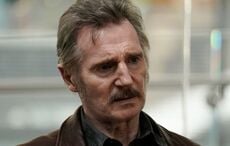The Irish Arts Center’s inaugural Irish Poetry Festival was a standing room only event last Saturday in New York, proving that the demand for a forum for Irish verse is as strong as ever.
Six contemporary Irish poets gave spirited readings, signed books and then met with the public in an event that ran so smoothly and was so warmly received that the only wonder is that this was its first ever outing.
Like so many of the very best arts initiatives, the Irish Arts Center’s Poetry Fest had its origin as a conversation between two arts professionals in 2008, playwright and journalist Belinda McKeon and Aidan Connolly, the executive director of the Irish Arts Center.
McKeon, whose most recent play “Fugue” was part of September’s 1st Irish Theatre Festival, curates the annual Dun Laoghaire-Rathdown Poetry Now Festival in Dublin and was a natural choice to lead the initiative, approaching the job with an already established list of contacts in contemporary Irish poetry.
Connolly immediately knew that the Irish Arts Center would be an ideal venue for a new poetry festival, and understood that the center’s discerning audience would welcome a deeper literary engagement with Irish culture. It would be a surefire success, he believed.
With the idea for the project approved McKeon was soon joined by co-curator and well-known Irish writer and academic Aengus Woods, and with sponsorship from NYU’s Glucksman Ireland House, Culture Ireland and the Poetry Society of America a fully-fledged festival was born.
The poem and the spoken word have been central to Irish culture for millennia, and that’s a powerful rejoinder to a world that nowadays thinks in sound bites and bottom lines, without pausing to reflect on the lines preceding and following.
In many ways curating a fledgling poetry festival is a courageous thing to do because it’s the poor relation, the least funded of all the art forms, the hardest to bring to the public and the most commonly overlooked, as fewer people actually buy poetry nowadays.
Yet Irish poetry has remained vital, some might say the most vital of all the forms of contemporary Irish literature, and the readings at the Arts Center on Saturday confirmed it.
Featuring poets who exemplify this notion, the curators wisely selected Harry Clifton, Eileen Ni Chuilleanain, Paula Meehan, Peter Sirr, and Enda Wyley, each of whom represent and simultaneously break with perceived notions about Irish literary traditions, making for lively readings.
The Irish Arts center is also to be congratulated for looking an unfortunate reality square in the face -- the job of the poet is to restore us, to make us more fully present to ourselves, and to describe, celebrate, lament or even transcend everyday life, but rarely do the poets themselves make any money from the effort.
Acknowledging this fact, the curators ensured that volumes of the works of each writer were prominently for sale in the foyer were the public was snapping them up after the series of readings.
Most people nowadays don’t feel they have the time to attend a poetry festival, truth be told. That’s why the experience of actually attending one is such a spirit shocking surprise to the public.
If you do actually show up you’ll probably be moved, startled, elated and replenished by what you see and hear because poetry stems from the head, the heart and the soul and it does wonders for each.
On Saturday, each of the invited Irish poets explored the particular and the universal in their own work, acknowledging their Irish heritage while reminding the audience that nowadays the Irish experience is a global enterprise.
“The whole day was a delight,” Connolly told IrishCentral’s sister publication the Irish Voice. “As with anything new there was extra buzz because this was the first of its kind. It sounds simple to set up, but in order to make something like this happen somebody has to care about it.
“Once it does happen it feels inevitable, but there are a lot things that feel inevitable and never happen. We really had a chance to match our mission with the real needs of an artistic community. We were glad to do it. Then it starts to feel effortless and inevitable.”




Comments